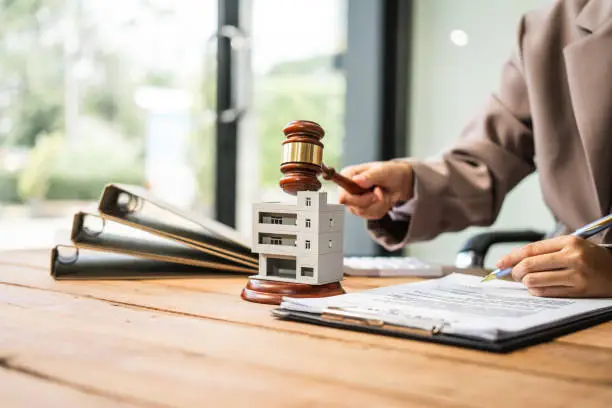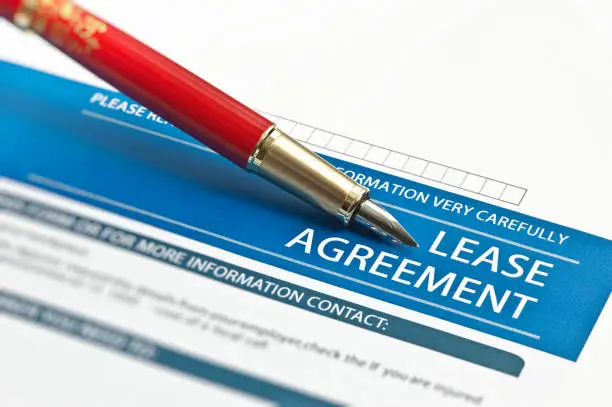When buying residential property, the role of commercial conveyancing solicitors in lease negotiations is often overlooked. However, understanding the lease agreement’s terms is essential for purchasing a house, a flat, or other leasehold property.
These terms can impact your rights as a property owner and the value of your investment.
In this article, we’ll discuss the importance of commercial conveyancing solicitors in negotiating leases, how they protect your interests, and ways they help secure favourable terms.
Understanding Leasehold vs. Freehold
Before exploring the role of conveyancing solicitors, it’s helpful to understand the distinction between leasehold and freehold properties.
Freehold: With a freehold property, you own the building and the land it stands on outright. Freeholds tend to be houses rather than flats. With this ownership type, you’re responsible for the upkeep, and there’s no annual ground rent or service charge.


Leasehold: Leasehold properties are common for flats and some newer houses. Leasehold means you own the property for a specific period, often decades or even hundreds of years, but you don’t own the land. You’re essentially leasing the property from a freeholder or landlord. Ownership reverts to the freeholder when the lease expires unless you extend it.
The freeholder sets the terms in leasehold agreements. These terms cover ground rent, service charges, property upkeep responsibilities, and restrictions on alterations. Therefore, having a knowledgeable commercial conveyancing solicitor involved in your lease negotiations is invaluable.
Conveyancing Solicitors’ Role in Lease Negotiations
A commercial conveyancing solicitor is a legal expert and an advocate who works to protect your financial and legal interests in the property transaction. Here’s how they help when it comes to lease negotiations:
Ensuring Transparency on Lease Terms
One of the primary responsibilities of commercial lease solicitors is to review and explain the lease agreement. Lease documents often include legal terminology and clauses that can be challenging for buyers to understand. A solicitor will break down the terms in clear language, ensuring you understand all aspects of the lease.


Standard clauses that solicitors will review include:
Ground rent and service charges: A solicitor can assess whether these charges are fair, how often they’ll be reviewed, and whether there’s a history of steep increases. This review is critical as escalating ground rents can decrease a property’s future value.
Restrictions on usage: Some leases restrict alterations, subletting, or keeping pets. A solicitor will identify any restrictions that might impact your intended use of the property.
Identifying Potential Red Flags
Many lease agreements contain clauses that might seem harmless but can create significant issues down the line. For example, escalating ground rents or service charges can damage your property’s resale value.
A commercial conveyancing solicitor will spot these potential red flags. They will alert you to any onerous terms, like uncapped service charges or unreasonable forfeiture clauses, and negotiate more favourable terms where possible.


Potential red flags include:
Short lease duration: If the lease has fewer than 80 years remaining, it could be costly to extend, and the property may be tricky to sell or remortgage later. A solicitor can advise on extension possibilities or negotiate with the seller to secure a longer lease.
Transfer fees and sublet fees: Some leases include fees for transferring ownership or subletting. If possible, solicitors will review these terms to ensure they’re reasonable or negotiate their removal.
Negotiating Favourable Terms
Lease agreements are legally binding, and their terms can impact your finances and enjoyment of the property. A solicitor will negotiate terms to ensure your lease is fair. For example, they may secure a service charge cap or negotiate a lease extension.


Your solicitor might negotiate the following terms:
Ground rent review terms: To prevent excessive future increases and ensure that any increases align with inflation.
Flexible lease extensions: If the remaining lease term is low, a solicitor can negotiate an extension from the outset to avoid future complications and costs.
Maintenance obligations: Clarifying responsibilities for repairs and maintenance can save you money, as some freeholders require leaseholders to contribute to major refurbishments.
Protecting Your Investment
Residential leases with restrictive or expensive terms can reduce your investment’s value and limit your future options. Commercial conveyancing solicitors help protect your long-term interests by ensuring manageable, resale-friendly lease terms. They’ll advise on conditions that could affect reselling or remortgaging the property and ensure the lease will benefit future buyers and lenders.

Choosing the Right Solicitor
Not all conveyancing solicitors specialise in leases or have the expertise to handle complex negotiations. Consider the following signposts to help you make the right choice:
Leasehold Property Experience: Look for a solicitor with a track record in leasehold transactions and familiarity with the local property market.

Fees Transparency: Lease negotiation services may come at an additional cost, so ensure the solicitor provides a clear breakdown of fees.

Strong Communication Skills: Property law can be complex, and a good solicitor will communicate clearly and keep you informed throughout the negotiation process.

What to expect from the Conveyancing Process
Working with a conveyancing solicitor is essential in managing the lease negotiation process and overall purchase. Here’s an overview of what the process typically involves:
Preliminary Review: Your solicitor will review the lease terms, title documents, and seller’s information.

Searches and Enquiries: They’ll conduct necessary searches, including local authority, environmental, and title checks, to confirm the property’s status and potential issues.

Negotiating Terms: They’ll communicate with the freeholder’s solicitor to negotiate any terms, such as ground rent caps or lease extensions.

Signing and Completion: Once you’re satisfied with the lease terms, you’ll sign the contract, and the property ownership will be transferred upon completion.

Buying a leasehold residential property requires careful consideration of the lease’s terms. A skilled commercial conveyancing solicitor ensures the lease agreement protects your interests, clarifies your rights, and secures favourable terms. By hiring an experienced solicitor to guide you through this process, you’re investing in a safer, more secure future for your new property.
Need expert, cost-effective help with residential conveyancing?
Toomey Legal offers quality residential property advice at value-driven rates. We deliver our reliable expertise quickly, professionally, and responsively, offering practical solutions at fixed fees with no hidden costs.
Call now for a quote or fill out the below form with details of your enquiry.
